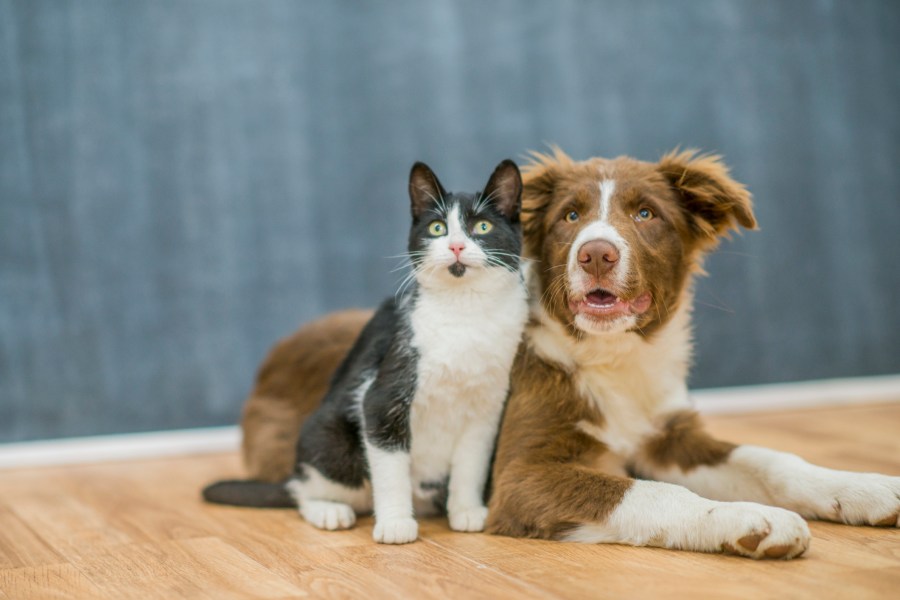Easy Treatment for Manage Mites Dog Amazon

While cats would likely be the first to insist that they have absolutely nothing in common with their canine counterparts, this isn't necessarily the case. Though the feud between cats and dogs has raged on for centuries, the two creatures aren't as different as some might assume. Whether you're a cat person, a dog person, or somewhere in between, join us for a look at some of the biological similarities and differences between cats and dogs.
Cats and Dogs Are Both Carnivora
Scientifically speaking, both cats and dogs are Carnivorans, or members of the order Carnivora. Granted, the order is a pretty far-ranging one and also includes land mammals like bears, badgers, skunks, and more. Even some sea-dwelling creatures such as seals, walruses, and sea lions lay claim to the Carnivoran name.

What unites this diverse group of creatures? One of the key features that most of them share is their teeth, namely their enlarged fourth upper premolar and first lower molar. Together these teeth form what's known as the "carnassial pair," which are a set of chompers designed for cutting through meat.
But don't let the name fool you because not all Carnivorans are actually carnivores. Some prefer to use their well-defined molars to break down tough plants, like bamboo. Even dogs are technically omnivores and can survive on a vegetarian diet alone if they have to.
Some say that if you go back far enough, all humans are related. The same is true for cats and dogs. Scientists now believe that modern-day cats and dogs may have evolved from miacids, a group of creatures that lived about 62- 34 million years ago. While they roamed the earth for approximately 28 million years, miacids sadly went the way of the dinosaur long ago and are now all extinct.
As far as their appearance, miacids were long, four-legged, furry creatures that probably looked similar to modern-day martens. Not only were they carnivores, but cats and dogs of today still share some of their other traits, such as long tails, fur, and clawed paws. Ultimately, however, cats and dogs went their separate ways, forming two different carnivore sub-groups. Cats belong to the "Feliformia" group of "cat-like" carnivorans, while dogs belong to a "dog-like" group called "Caniformia."
Cats and Dogs Probably Domesticated Themselves
There are many theories about when, where, and how both cats and dogs were first domesticated. The truth is that it happened so long ago that we may never know the full story. But in both cases, there's evidence to suggest that both cats and dogs were just as interested in humans as we were in them. What was the common bond? Food, of course.

Back in ancient times, things were a lot different than they are today, especially where food was concerned. Some historians believe that dogs were first domesticated when they became drawn to the scraps that ancient humans would leave lying around. Ultimately, the humans began offering the dogs food and shelter in return for their help with hunting.
Cats, it seems, first became drawn to people after realizing that rodents tended to hang out around human cities. So, of course, they stepped in and began dining on the pesky vermin, which it turned out humans really appreciated. Much like in the case of dogs, it was a win-win situation all around, and eventually, humans and kitties formed the tight-knit bond we've enjoyed ever since.
Kitties and Pooches Are Both Territorial
Perhaps one of the reasons behind the long-standing feud between cats and dogs is that both animals are naturally territorial. This goes back to the fact that being able to lay claim to a certain area or set of resources was often a survival necessity in the wild. After all, humans are much the same in this regard.
When it comes to protecting their space, cats are actually even more territorial than dogs. You may have seen this demonstrated for yourself if you've ever introduced a new pet into your home. Whether it be their house or entire neighborhood, kitties have a very distinct idea of "their" space, namely wherever they've sprayed their scent. Woe to any creature who dares cross this boundary, as they will likely be greeted with swats and hisses.
While dogs are more social than cats, they too are territorial by nature. Given that dogs travel in packs, their territoriality may even extend to being overly protective of their humans, as in cases of leash aggression. While this type of behavior can be trained out of a dog, it's a little harder where cats are concerned.
Prey, Drive, and Stealth
There's a reason that cats and dogs both tend to enjoy games that involve stalking, chasing, and biting things. Both cats and dogs are natural hunters and are born with instincts that would allow them to exist in the wild if they had to. Kittens and puppies are born with hunting in their DNA, and, to some extent, this prey drive remains active throughout their entire lives.

This is why dogs tend to go crazy at the site of a squirrel and love nothing more than chasing down a ball. Cats too are always in search of something to stalk from the shadows, whether it be a piece of string or their unsuspecting owner's ankles. Even if your family cat or dog has never actually killed another creature in their lives, their prey drive will live on. This is why it's so important to help your pets find healthy outlets for their natural instincts through play.
Source: https://www.reference.com/pets-animals/similarities-between-cats-dogs?utm_content=params%3Ao%3D740005%26ad%3DdirN%26qo%3DserpIndex&ueid=0ecb0a5c-3643-4f67-92da-f6566ec48a07